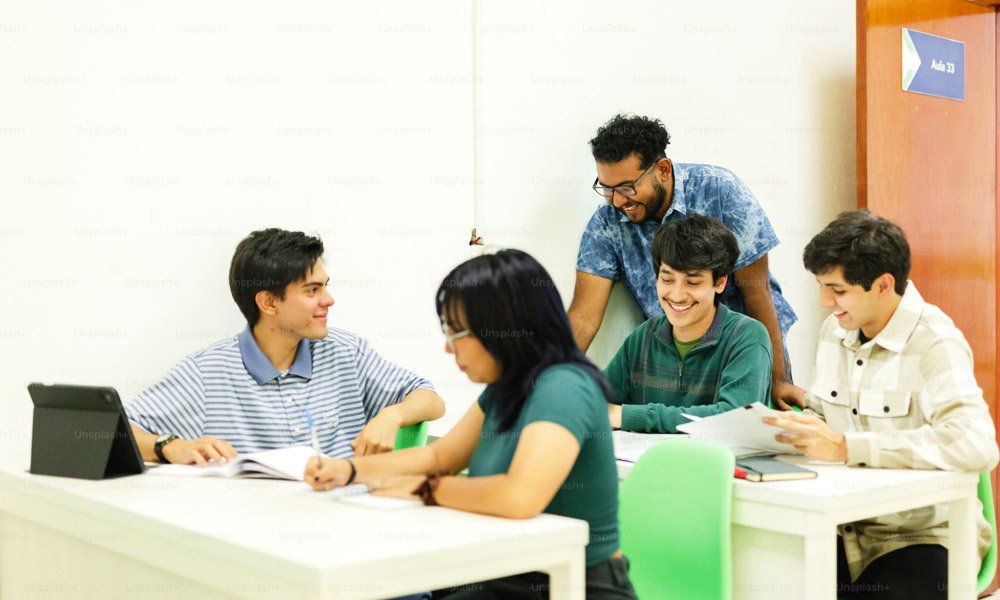Education
Education: The Foundation of a Progressive Society
Published
7 hours agoon
By
Archie
Education is the cornerstone of human development and societal progress. It is more than the process of acquiring academic knowledge—education equips individuals with the skills, values, and confidence needed to thrive in life and contribute meaningfully to the world. From early childhood learning to higher education and lifelong skill-building, the impact of education is profound and far-reaching.
In today’s fast-evolving world, the role of education has expanded beyond traditional classrooms. It now encompasses digital literacy, emotional intelligence, global awareness, and adaptability. This article explores the significance of education, its challenges, modern transformations, and why it remains the most powerful tool for individual and collective growth.
What is Education?
Education is a structured process of learning in which knowledge, skills, beliefs, and values are passed from one generation to another. It occurs through teaching, training, research, or practical experience. While formal education takes place in schools, colleges, and universities, informal education occurs in everyday life through interaction, observation, and exploration.
The core aim of education is to empower individuals to reach their full potential and lead responsible, productive lives. It also serves to develop a society that is informed, tolerant, and progressive.
Types of Education
1. Formal Education
This includes structured academic learning provided by institutions such as schools, colleges, and universities. It follows a set curriculum and results in recognized certifications or degrees.
2. Informal Education
Learning outside the classroom—such as through family, media, travel, and daily experiences—forms the basis of informal education. It is spontaneous and often unstructured.
3. Non-formal Education
This is organized learning outside the formal system, such as vocational training, workshops, online courses, and community education programs.
Importance of Education
🌍 Social Development
Education teaches individuals how to interact with others, respect different cultures, and engage in democratic processes. It encourages civic responsibility and social harmony.
💼 Economic Empowerment
With education, people acquire skills that increase employability and income potential. A well-educated population fuels economic growth, innovation, and competitiveness.
🧠 Personal Growth
Education helps develop critical thinking, problem-solving skills, creativity, and emotional intelligence. It nurtures curiosity and lifelong learning.
👩⚕️ Health and Wellbeing
Studies show that educated individuals make better health decisions, leading to longer life expectancy, lower infant mortality, and improved quality of life.
🛡️ Equality and Empowerment
Education is a powerful tool to break the cycle of poverty and inequality. It especially empowers marginalized groups, including women and minorities, by giving them the knowledge and confidence to claim their rights.
Challenges in Global Education
Despite its importance, education systems around the world face numerous challenges:
🔹 Access and Inclusion
Millions of children and adults still lack access to basic education due to poverty, conflict, discrimination, or geographic isolation.
🔹 Quality of Education
In many regions, poor infrastructure, untrained teachers, outdated curriculum, and lack of resources result in low-quality education.
🔹 Digital Divide
With the rise of online learning, access to technology has become critical. Unfortunately, many students—especially in developing countries—do not have reliable internet or devices.
🔹 Gender Disparities
In some societies, cultural norms and economic constraints prevent girls from attending school, limiting their future opportunities.
The Role of Technology in Modern Education
Technology is transforming how we learn, teach, and access knowledge. It has created more inclusive, interactive, and flexible education models.
💻 E-Learning and Online Platforms
Virtual classrooms, MOOCs (Massive Open Online Courses), and learning apps have made education accessible to millions. Platforms like Coursera, Khan Academy, and edX offer courses from top institutions worldwide.
🤖 AI and Adaptive Learning
Artificial Intelligence is being used to personalize learning experiences. Adaptive learning systems adjust content based on a learner’s pace, strengths, and weaknesses.
🌐 Global Classrooms
Technology allows students from different parts of the world to collaborate and learn together, fostering cross-cultural understanding.
📱 Mobile Learning
Smartphones and tablets enable students to access educational content anytime, anywhere, supporting continuous and on-the-go learning.
The Future of Education
As the world changes, so must education. The future of learning is likely to be:
🔸 Student-Centered
Education will focus more on individual interests, learning styles, and goals rather than a one-size-fits-all curriculum.
🔸 Skills-Based
The emphasis will shift from rote memorization to skills such as critical thinking, communication, collaboration, and digital literacy.
🔸 Lifelong and Continuous
Education will no longer be limited to childhood or early adulthood. People will continually upgrade their skills to stay relevant in a rapidly changing job market.
🔸 Hybrid and Blended
A combination of in-person and online learning will become the norm, allowing greater flexibility and access.
Global Movements Supporting Education
Several global initiatives aim to ensure inclusive and quality education for all:
- UN Sustainable Development Goal 4: “Ensure inclusive and equitable quality education and promote lifelong learning opportunities for all” by 2030.
- UNESCO Education for All (EFA): Focuses on universal access to basic education.
- Global Partnership for Education (GPE): Works with developing countries to strengthen education systems.
These efforts highlight the shared global recognition of education as a human right and a critical driver of sustainable development.
How Individuals Can Support Education
Improving education is not just the responsibility of governments and institutions. Individuals can make a difference too:
- Support Local Schools: Volunteer, donate supplies, or mentor students.
- Promote Literacy: Read with children, start book clubs, or support libraries.
- Advocate for Equal Access: Raise awareness about the importance of education, especially for marginalized communities.
- Embrace Lifelong Learning: Take courses, attend workshops, and encourage others to pursue knowledge.
Conclusion
Education is more than a pathway to a career—it’s the foundation for building a better life and a better world. It fosters peace, innovation, economic prosperity, and personal fulfillment. While the challenges are many, the opportunities are even greater. By investing in education today, we pave the way for a brighter, more equitable tomorrow.
In the words of Nelson Mandela:
“Education is the most powerful weapon which you can use to change the world.”
You may like

Meet Lorelei Frygier: The Inspiring Mom Behind Kristen Bell’s Success

The Remarkable Journey of Gilbert Hartmann LaPiere, Cher’s Adoptive Father

Dion Anthony Fay: The Heartbreaking Story of Barbara Stanwyck’s Adopted Son

Rodney Keith Jones: The Untold Story of Leslie Jones’ Beloved Brother

Who was A.K. Kotb? Everything About Hoda Kotb’s Beloved Father

Why Enclosed Auto Transport Is the Gold Standard for Exotic Cars

The Importance of Technology in Car Shipping

How AI Voice Agents Are Transforming Outbound Calling in 2025

Education: The Foundation of a Progressive Society

Jack Neville Lando: The Private Life of Joe Lando’s Eldest Son

Revolutionizing Healthcare: The Emergence of AI-Driven Analytics

How Machine Learning and AI are Redefining the Future?

Aliza Barber: Meet Lance Barber’s Wife, Age, Life, Profile, Career and Net Worth

Evelyn Melendez: Jordan Knight’s Wife Bio, Marriage, Family, Career and Net Worth

Who was Alice Marrow? Everything to Know About Ice-T’s and His Mother

Ilan Tobianah Biography: Family, Marriage, Lifestyle, Career and Net Worth

Meet Otelia Cox: The Supportive Wife of Tony Cox – A True Fairy Tale Romance

King Von’s Autopsy Report: The Truth Behind the Tragic Death

Tex9.net Business: Solve Business Problems with the Help of Tex9.net

Exploring Real Estate Market: Smart Strategies for Savvy Investors

Meet Lorelei Frygier: The Inspiring Mom Behind Kristen Bell’s Success

The Remarkable Journey of Gilbert Hartmann LaPiere, Cher’s Adoptive Father

Dion Anthony Fay: The Heartbreaking Story of Barbara Stanwyck’s Adopted Son

Rodney Keith Jones: The Untold Story of Leslie Jones’ Beloved Brother

Who was A.K. Kotb? Everything About Hoda Kotb’s Beloved Father

Why Enclosed Auto Transport Is the Gold Standard for Exotic Cars

The Importance of Technology in Car Shipping

How AI Voice Agents Are Transforming Outbound Calling in 2025

Education: The Foundation of a Progressive Society

Jack Neville Lando: The Private Life of Joe Lando’s Eldest Son
Category
Trending
-

 Health2 years ago
Health2 years agoRevolutionizing Healthcare: The Emergence of AI-Driven Analytics
-

 Technology2 years ago
Technology2 years agoHow Machine Learning and AI are Redefining the Future?
-

 Celebrity1 year ago
Celebrity1 year agoAliza Barber: Meet Lance Barber’s Wife, Age, Life, Profile, Career and Net Worth
-

 Celebrity1 year ago
Celebrity1 year agoEvelyn Melendez: Jordan Knight’s Wife Bio, Marriage, Family, Career and Net Worth
